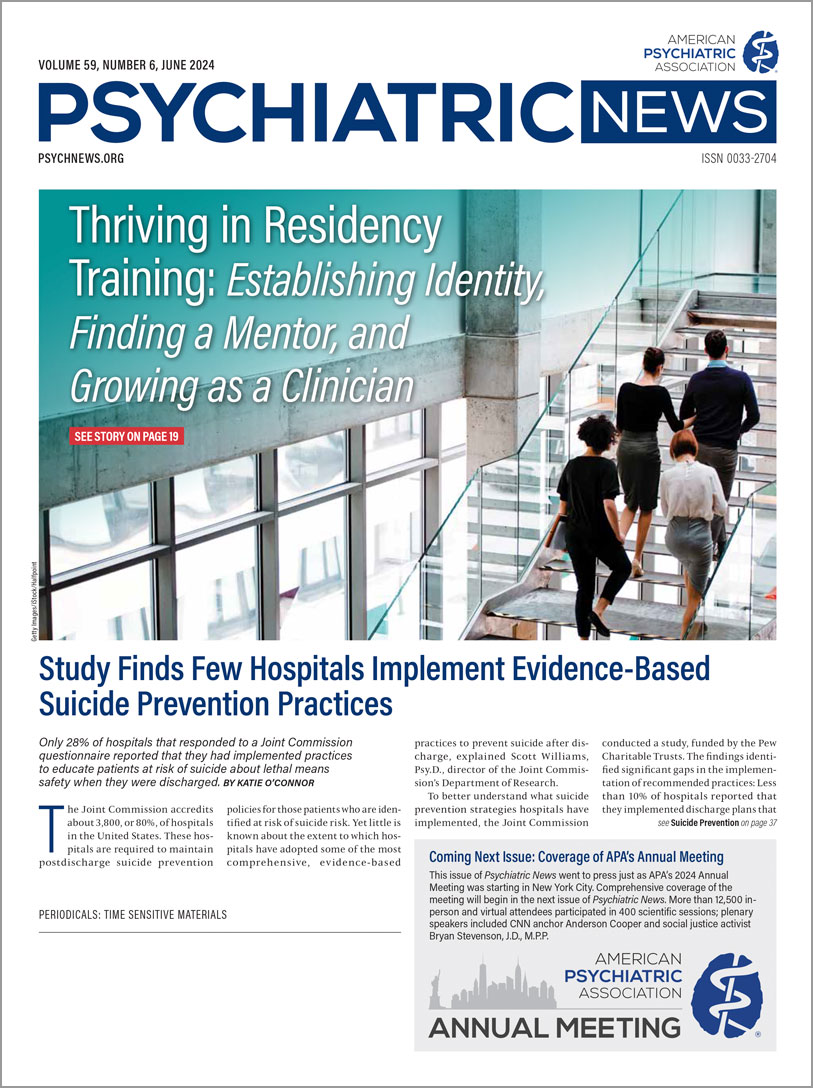Psychiatry Residency Builds Global Reach by Using Local, Overseas Settings
Abstract
Global mental health in residency begins at home and visits many continents.
Mental illness knows no boundaries, a fact that some psychiatry residency programs are incorporating into their training.
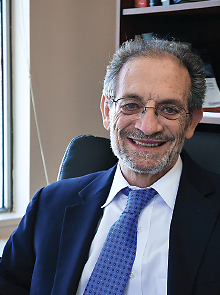
George Washington University psychiatry chair James Griffith, M.D., sees the value of preparing psychiatrists to work in culturally complex settings.
“Global mental health is mental health anywhere but here,” said James Griffith, M.D., chair of psychiatry at George Washington (GW) University, with perhaps a touch of irony, given that his residents can begin their “global” clinical work in the next county.
Global mental health has its roots in three overlapping domains, said Griffith—cultural anthropology, acute disaster, and postconflict response, and a public health tradition of alleviating suffering in a world where resources can be scarce. Programs typically combine local work with immigrants with several months overseas, usually in the fourth year of residency.
Just how many residency programs include such components is unclear.
“My impression is that the majority of training programs don’t have a global mental health component, but I think there is increasing interest,” said Christopher Varley, M.D., a professor of psychiatry and behavioral health at the University of Washington and president of the American Association of Directors of Psychiatric Residency Training.
A survey of 171 residency training directors (which received just 59 responses) published in 2011 found that they “endorsed the value of international experiences during residency, but their availability and educational impact are not fully supported.”
So GW and a few other programs appear to be unusual in their embrace of global mental health. Several factors may complicate their establishment. For instance, how will programs cover the cost of an overseas placement or make up clinical coverage or research time for a resident who may be away for months at a time?
Nevertheless, there may well be increasing interest in the concept, said Giuseppe Raviola, M.D., an assistant professor of psychiatry and of global health and social medicine at Harvard Medical School and director of mental health programs for Partners in Health.
“More medical students today are interested in global health, including those going into psychiatry,” said Raviola in an interview. “So psychiatry residency programs will need to offer global mental health options to attract the best new residents.”
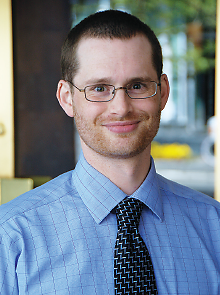
Harvard Medical School graduate and PGY-4 Michael Morse, M.D., chose George Washington for residency because of its global mental health track.
“I think global mental health reflects an understanding that in addition to serving communities locally, one way we can do more good is to look beyond our borders,” said PGY-4 Michael Morse, M.D., a 2014-2015 APA American Psychiatric Leadership Fellow.
“Global mental health is not something you tack onto a residency training program,” said Morse in an interview. “Rather, it’s like any other competency in residency, where you need to do it and do it a lot and have mentors and supervisors who can help you learn from their experience.”
Within the GW program, all residents take a 12-week seminar in global mental health in their second year. PGY-3s who select the global track then spend several hours a week at Northern Virginia Family Services, an independent agency across the Potomac River in Fairfax County.
“We think you don’t learn this by going to other countries,” said Griffith. “You train residents and work with immigrant and refugee populations here, develop the skill sets, and when they have them, go on to international sites.”
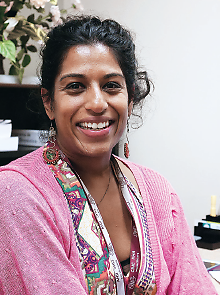
“You feel the world is so much bigger than your own small community,” said former GW resident Anjuli Jindal, M.D.
Anjuli Jindal, M.D., began working at the clinic as a PGY-3 in 2007 and has served as a consultant for four hours a week since 2009. She evaluates immigrants and people seeking asylum in the United States and also supervises GW residents.
“You feel the world is so much bigger than your own small community,” she said. “I continued here because I felt this was so important, so needed.”
In addition to the tales of the difficulties in adjusting to a new country or the graphic stories of trauma in their home countries experienced by refugees, Jindal has heard and is heartened by her patients’ resilience and recovery.
“It restores your faith in kindness and the human connection.”
Fourth-year residents can elect to work on a mental health program overseas or a general medical project in another country as a team psychiatrist.
In recent years, GW residents have participated in global mental health research, training, or human-rights projects in Liberia, Uganda, South Africa, Greece, the West Bank, Cambodia, Nepal, and India, said Griffith.
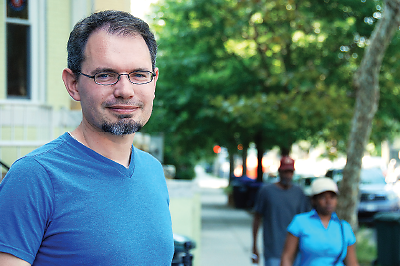
Psychiatrist and anthropologist Brandon Kohrt, M.D., Ph.D., has applied lessons from his George Washington University residency to his work in Mongolia, Nepal, and Liberia.
Brandon Kohrt, M.D., Ph.D., finished his residency in 2013 and is now an assistant professor of psychiatry at Duke University and a member of the Duke Global Health Institute in Durham, N.C. He values the time spent in the Northern Virginia clinic.
“We got daily practice with refugees and asylum seekers here as preparation for our overseas work,” Kohrt told Psychiatric News.
Both Morse and Kohrt developed their overseas connections before they arrived at GW.
Kohrt’s doctorate is in anthropology. Even before he came to GW, he did extensive field work in Mongolia on a culturally specific syndrome analogous to chronic fatigue syndrome and with former child soldiers in Nepal. He helped produce documentary films on those topics in each country. He also worked as a consultant to an antistigma program in Liberia.
“I had an awareness of the context and needs of low-resource settings, but GW gave me the tools,” said Kohrt.
Griffith provided some of those tools, like adapting psychotherapy for use in low-resource, low-income settings, with lessons drawn from his own work in Kosovo in the 1990s.
Before starting medical school at Harvard in 2005, Morse spent time talking with physicians in the West Bank about their professional needs, which came down largely to opportunities for clinical training.
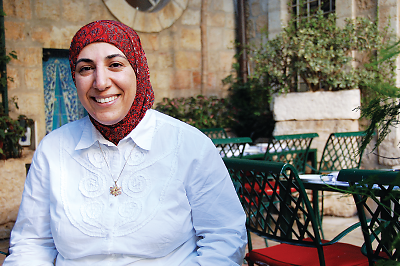
Jerusalem native Samah Jabr, M.D., who did her postgraduate training in psychiatry in Paris, is working with members of the Department of Psychiatry at George Washington University to create a community mental health center in the West Bank to train local medical school graduates in psychiatry.
In 2009, he completed a rotation in the clinic of psychiatrist Samah Jabr, M.D., in Bethlehem. Morse was impressed by her ability to communicate with and diagnose her patients. And Jabr valued his presence, too. “I would welcome more students like Michael to come and learn for themselves, not so much from the experts like me, but from the patients,” said Jabr in an interview.
Morse is working now with Griffith, Associate Clinical Professor Elizabeth Berger, M.D., faculty members, and GW School of Medicine Dean (and psychiatrist) Jeffrey Akman, M.D., on plans to develop an academically affiliated community mental health center in the West Bank.
At present, there are no opportunities for postgraduate psychiatry training there. Palestinian medical school graduates who want to specialize in psychiatry must go abroad to train. Morse and the GW faculty seek to phase in over a five-year span both rotations for George Washington PGY-4 residents and extended visits by faculty members. The program would combine clinical care, services research, public outreach, and advocacy, along with training for local medical and other students to inspire them to choose careers in mental health.
Even now, however, Daniel Lieberman, M.D., a professor at GW, and other GW faculty members are providing long-distance consultation and supervision on complex cases for Jabr and her colleagues by phone, email, and Skype.
“International partnerships are very important,” said Jabr. “It helps us improve our standards, and it also helps us in communicating our experience to people from the international community. So this is another motivation for me to connect with George Washington University.”
Organizing these overseas residency segments isn’t simple.
Programs need to achieve some balance of research, service delivery, and capacity building within a country, said Raviola.
“In our department, we have deliberately focused on developing infrastructure—identifying and working with local resources and building their capacity and not on ourselves being primary deliverers of care,” said Griffith.
Funding is another issue.
“We are just now gaining a limited amount of sustained, stable funding for residents’ international projects,” he said. Supporting these projects has demanded pulling together a combination of specific grant money, some departmental or medical school funds, and a resident’s personal funds. A stable source of funding for the long term is the next big project on Griffith’s agenda.
As for the residents, they take their psychiatric knowledge to their assignments in the United States and other countries, but they also bring something back home. On a practical level, they learn how to provide psychiatric care in low-income, low-resource settings, a skill that can be applied in many parts of the United States. They also gain new and lasting insights into how to treat patients who experience life in different cultures, wherever they may live. ■
More information about the George Washington University Department of Psychiatry and Behavioral Sciences’ Global Mental Health Track can be accessed here.



